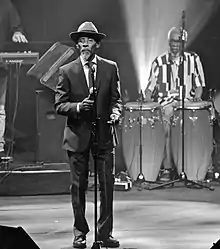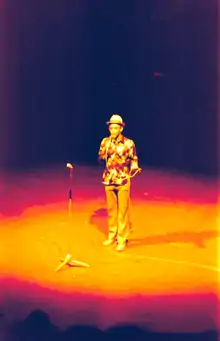Linton Kwesi Johnson
Linton Kwesi Johnson (born 24 August 1952), also known as LKJ, is a Jamaican dub poet and activist who has been based in the United Kingdom since 1963. In 2002 he became the second living poet, and the only black poet, to be published in the Penguin Modern Classics series.[1][2] His performance poetry involves the recitation of his own verse in Jamaican patois over dub-reggae, usually written in collaboration with renowned British reggae producer/artist Dennis Bovell.
Linton Kwesi Johnson | |
|---|---|
 Linton Kwesi Johnson in concert in Brussels, 2017 | |
| Background information | |
| Also known as | LKJ |
| Born | 24 August 1952 Chapelton, British Jamaica |
| Genres | Dub poetry |
| Occupation(s) | Poet, activist |
| Years active | 1978–present |
| Associated acts | Dennis Bovell |
| Alma mater | Goldsmiths College |
| Awards | Order of Distinction PEN Pinter Prize |
| Website | lintonkwesijohnson |
Early life
Johnson was born in Chapelton, a small town in the rural parish of Clarendon, Jamaica. His middle name, "Kwesi", is a Ghanaian name that is given to boys who, like Johnson, are born on a Sunday.[3] In 1963 he and his father came to live in Brixton, London, joining his mother, who had immigrated to Britain shortly before Jamaican independence in 1962.[1] Johnson attended Tulse Hill School in Lambeth. While still at school he joined the British Black Panther Movement,[4] helped to organise a poetry workshop within the movement, and developed his work with Rasta Love, a group of poets and drummers.
Johnson went on to study for a degree in sociology at Goldsmiths College in New Cross, London, graduating in 1973.[5] During the early to mid-1970s he was employed as the first paid library resources and education officer at the Keskidee Centre,[6][7] where his poem Voices of the living and the dead was staged, produced by Jamaica novelist Lindsay Barrett, with music by the reggae group Rasta Love. Johnson has recalled: "it was fantastic, you know, having written something and having it staged with actors and musicians. That was back in 1973 before I had a poem published anywhere. That was before anyone had ever heard of Linton Kwesi Johnson."[8]
Johnson wrote for New Musical Express, Melody Maker, and Black Music in the 1970s,[5] and while working on a freelance basis for Virgin Records during this period he wrote biographies for reggae artists on the label, as well as sleeve notes and copy for adverts.[9]
Career
Poetry

Most of Johnson's poetry is political, dealing mainly with the experiences of being an African-Caribbean in Britain: "Writing was a political act and poetry was a cultural weapon...",[10] he told an interviewer in 2008. However, he has also written about other issues, such as British foreign policy and the death of anti-racist marcher Blair Peach. Johnson wrote "Reggae fi Dada" on the death of his father in 1982, blaming social conditions.[1] His most celebrated poems were written during the government of Prime Minister Margaret Thatcher. The poems contain graphic accounts of the racist police brutality occurring at the time (cf. "Sonny's Lettah"). Johnson's poetry makes clever use of the unstandardised transcription of Jamaican patois.
Johnson's poems first appeared in the journal Race Today, which published his first collection of poetry, Voices of the Living and the Dead, in 1974.[5] Dread Beat An' Blood, his second collection, was published in 1975 by Bogle-L'Ouverture.[4]
A collection of his poems has been published as Mi Revalueshanary Fren by Penguin Modern Classics. Johnson is one of only three poets to be published by Penguin Modern Classics while still alive.
Music

Johnson's best-known albums include his debut Dread Beat an' Blood (1978), Forces of Victory (1979), Bass Culture (1980), LKJ in Dub (1980), and Making History (1983). Across them are spread classics of the dub poetry school of performance – and of reggae itself – such as "Dread Beat An' Blood", "Sonny's Lettah", "Inglan Is A Bitch", "Independent Intavenshan" and "All Wi Doin Is Defendin". His poem Di Great Insohreckshan is his response to the 1981 Brixton riots.[10] The work was the subject of a BBC Radio 4 programme in 2007.
Johnson's work, allied to the Jamaican "toasting" tradition, is regarded as an essential precursor of rap.
Johnson's record label LKJ Records, launched in 1981,[11] is home to other reggae artists, some of whom made up the Dub Band, with whom Johnson mostly recorded, and other dub poets, such as Jean "Binta" Breeze. Past releases on the label include recordings by Mikey Smith.[5]
Awards and honours

Johnson received a C. Day-Lewis Fellowship in 1977, and that year became writer-in-residence for the London Borough of Lambeth.[9] He was made an Associate Fellow of Warwick University in 1985 and an Honorary Fellow of Wolverhampton Polytechnic in 1987, and in 1990 received an award at the XIII Premio Internazionale Ultimo Novecento from the city of Pisa for his contribution to poetry and popular music.[12] In 1998 he was awarded the Premio Piero Ciampi Citta di Livorno Concorso Musicale Nazionale in Italy.[12]
In 2003 Johnson was bestowed with an honorary fellowship from his alma mater, Goldsmiths College, University of London. In 2004 he became an Honorary Visiting Professor of Middlesex University in London. In 2005 he was awarded a silver Musgrave Medal from the Institute of Jamaica for distinguished eminence in the field of poetry.[4] In 2012, he was awarded the Golden PEN Award by English PEN for "a Lifetime's Distinguished Service to Literature".[13][14][15]
He is a Trustee of the George Padmore Institute.[16]
In August 2014 it was announced that he would receive the Jamaican national honour of the Order of Distinction in October that year.[17]
On 20 April 2017 he was awarded an Honorary Doctorate of Literature (D.Litt.) by Rhodes University in South Africa.
In July 2020 Johnson was awarded the PEN Pinter Prize – established in Harold Pinter's name to defend freedom of expression and celebrate literature – for his commitment to political expression in his work.[18][19] Announcing the award, the judges described Johnson as "a Living legend", "a poet, reggae icon, academic and campaigner, whose impact on the cultural landscape over the last half century has been colossal and multi-generational.... His political ferocity and his tireless scrutiny of history are truly Pinteresque, as is the humour with which he pursues them."[20]
Bibliography
- Voices of the Living and the Dead – Creation for Liberation, 1974. ISBN 978-0950349879
- Dread Beat An' Blood – Bogle-L'Ouverture Publications, 1975. ISBN 978-0904521061
- Inglan is a Bitch – Race Today, 1980. ISBN 978-0950349824
- Tings An' Times – Bloodaxe Books, 1991. ISBN 978-1852241681
- Mi Revalueshanary Fren: Selected Poems – Penguin Modern Classics, 2002; 2006. ISBN 978-0141186986
Discography
- Dread Beat an' Blood – Virgin, 1978 (as Poet and the Roots).
- Forces of Victory – Island, 1979.
- Bass Culture – Island, 1980.
- The Best of Linton Kwesi Johnson – Epic, 1980 (compilation).
- LKJ in Dub – Island, 1980.
- Making History – Island, 1983.
- Reggae Greats – Mango, 1984 (compilation).
- LKJ Live in Concert with the Dub Band – LKJ Records, 1985.
- Dub Poetry – Mango, 1985 (compilation).
- Tings An' Times – LKJ Records, 1991.
- LKJ in Dub: Volume 2 – LKJ Records, 1992.
- LKJ Presents – LKJ Records, 1996.
- A Cappella Live – LKJ Records, 1996.
- Independent Intavenshan – Island, 1998 (compilation).
- More Time – LKJ Records, 1999.
- LKJ in Dub: Volume 3 – LKJ Records, 2002.
- Straight to Inglan's Head – Universal, 2003 (compilation).
- Live in Paris – Wrasse, 2004.
References
- Maya Jaggi, "Profile: Linton Kwesi Johnson – Poet on the front line", The Guardian, 4 May 2002.
- "(Media & Editorial Projects Ltd)". MEP Publishers. Retrieved 13 December 2012.
- Jaggi, Maya (3 May 2002). "Poet on the front line". The Guardian. ISSN 0261-3077. Retrieved 20 February 2019.
- Forbes; Peter (2002). "comtemporarywriters.com". Linton Kwesi Johnson. Archived from the original on 27 September 2007. Retrieved 13 May 2009.
- Larkin, Colin (1998), The Virgin Encyclopedia of Reggae, Virgin Books, ISBN 0-7535-0242-9, pp. 147–148.
- Paul Harper, "Islington’s Black History Month celebrates Keskidee Centre", Islington Gazette, 1 October 2011.
- "Archive Showcase: June", George Padmore Institute, 13 June 2013.
- "The Keskidee Centre (produced for" Islington as a Place of Refuge" online tour), Friends of Islington Museum.
- Sharmilla Beezmohun, "Linton Kwesi Johnson", Enciclopedia de Estudios Afroeuropeos.
- Wroe, Nicholas (8 March 2008). "I did my own thing". The Guardian. Retrieved 26 May 2014.
- "Linton Kwesi Johnson", The Poetry Archive.
- ""Linton Kwesi Johnson", Blue Flower Arts". Archived from the original on 28 May 2014. Retrieved 18 July 2013.
- Alison Flood (3 December 2012). "Linton Kwesi Johnson wins Golden PEN award". The Guardian. Retrieved 3 December 2012.
- "Golden Pen Award, official website". English PEN. Retrieved 3 December 2012.
- Sarah Morrison, "Linton Kwesi Johnson: 'Class-ridden? Yes, but this is still home'", The Independent, 2 December 2012.
- "Linton Kwesi Johnson", George Padmore Institute.
- Campbell, Howard (2014) "Marcia Griffiths to receive Order of Distinction", Jamaica Observer, 7 August 2014. Retrieved 10 August 2014.
- Cowdrey, Katherine (7 July 2020). "'Living legend' Linton Kwesi Johnson wins PEN Pinter Prize 2020". The Bookseller. Retrieved 7 July 2020.
- "Linton Kwesi Johnson awarded PEN Pinter Prize 2020". English PEN. 7 July 2020. Retrieved 7 July 2020.
- Flood, Alison (7 July 2020). "'Living legend' Linton Kwesi Johnson wins PEN Pinter prize". The Guardian. Retrieved 7 July 2020.
External links
| Wikimedia Commons has media related to Linton Kwesi Johnson. |
- LKJ Records – News, releases, tour dates, etc.
- Linton Kwesi Johnson at British Council: Literature includes a "Critical Perspective" section
- Spike Magazine interview
- Interview with Yuri Prasad in Socialist Review (2002)
- "Linton Kwesi Johnson", The Poetry Archive
- "Linton Kwesi Johnson performs If I Woz a Tap Natch Poet", The Guardian, 11 December 2008.
- Discography at Discogs
- "Poetic justice: black lives and the power of poetry", The Observer, 28 June 2020.